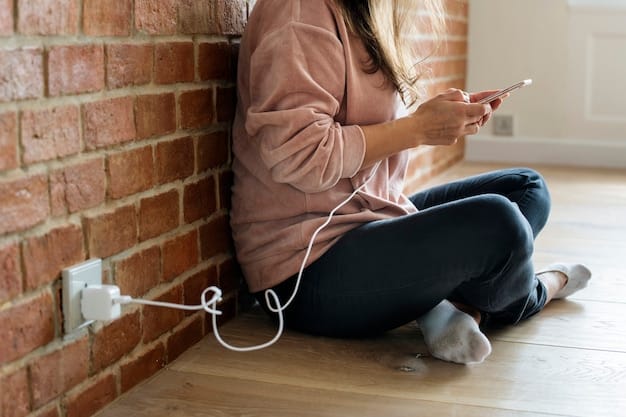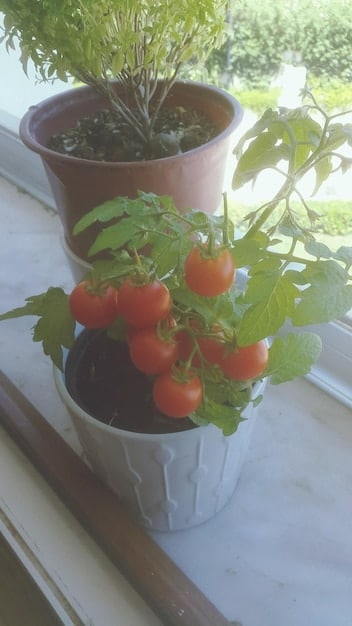Green Living on a Budget: Save Money and the Planet

Green living on a budget is possible by adopting sustainable practices such as reducing energy consumption, choosing eco-friendly products, and minimizing waste, which can lead to significant cost savings and a healthier planet.
Want to embrace a more sustainable lifestyle without breaking the bank? You can with green living on a budget. It’s about making conscious choices that benefit both your wallet and the environment, proving that eco-friendly living doesn’t have to be expensive, let’s check some tips!
Embrace Energy Efficiency at Home
Saving energy is not only great for the environment but also for your wallet. Start with simple changes around your home.
Switch to LED Lighting
LED bulbs use significantly less energy than traditional incandescent bulbs and last much longer. Consider replacing your current bulbs with LEDs.
Unplug Electronics When Not in Use
Many electronics continue to draw power even when they’re turned off. Unplug chargers, TVs, and other devices when you’re not using them to reduce “phantom” energy consumption.

Making these small changes can add up to big savings over time:
- Turn off lights when leaving a room.
- Use a power strip to easily switch off multiple devices.
- Adjust your thermostat to save on heating and cooling costs.
By being mindful of your energy consumption, you can reduce your carbon footprint and lower your monthly bills. Every little bit helps!
Reduce, Reuse, Recycle: The Golden Rule
The 3 R’s—reduce, reuse, and recycle—are cornerstones of sustainable living. They help minimize waste and conserve resources without costing a fortune.
Reduce Wasteful Consumption
Be mindful of what you buy. Opt for products with minimal packaging and avoid single-use items whenever possible.
Get Creative with Reusing
Before throwing something away, consider how it can be reused. Glass jars can become storage containers, and old t-shirts can be turned into cleaning rags.
By following these simple steps, you can minimize waste and make the most of what you already have:
- Bring reusable bags when shopping.
- Carry a reusable water bottle and coffee cup.
- Repair items instead of replacing them.
Reducing, reusing, and recycling not only conserves resources but also saves you money on new purchases and disposal fees.
Grow Your Own Food
Starting a small garden is a fantastic way to access fresh, healthy produce while saving money on groceries. You don’t need a lot of space to begin.
Start Small with Herbs and Vegetables
Even a small balcony or patio can accommodate a container garden. Start with easy-to-grow herbs like basil and mint, or vegetables like tomatoes and lettuce.
Compost Food Scraps
Composting turns kitchen waste into nutrient-rich soil for your garden. It’s a great way to reduce waste and improve your soil quality.

Gardening can be a rewarding and cost-effective way to supplement your diet:
- Save seeds from your produce to replant next season.
- Trade extra produce with neighbors.
- Use homemade fertilizer from compost.
Growing your own food not only saves money but also reduces your reliance on commercially produced, often heavily processed, items.
Shop Smart and Buy Secondhand
Being a conscious consumer can significantly reduce your environmental impact and save you money. Secondhand shopping is a great place to start.
Thrift Stores and Online Marketplaces
Thrift stores and online marketplaces offer a wide range of clothing, furniture, and household items at discounted prices. You can find unique pieces while giving items a second life.
Buy in Bulk
Purchasing non-perishable items in bulk can save money and reduce packaging waste. Store these items in reusable containers.
By shopping smart, you can reduce waste and save money:
- Look for items with minimal packaging.
- Choose durable, long-lasting products.
- Support companies committed to sustainability.
In the long run, mindful consumption helps you save money and reduces your ecological footprint.
Conserve Water Usage
Water conservation is beneficial for both the environment and your water bill. There are several simple ways to reduce your water consumption.
Install Water-Efficient Fixtures
Consider installing low-flow showerheads, faucets, and toilets. These fixtures use significantly less water without sacrificing performance.
Collect Rainwater
Rainwater can be collected and used for watering plants, washing cars, or other non-potable purposes. A rain barrel is an easy and affordable way to collect rainwater.
Following these water-saving tips can make a big difference:
- Take shorter showers.
- Fix leaky faucets promptly.
- Water your garden during cooler parts of the day to reduce evaporation.
By conserving water, you’ll lower your bills and contribute to preserving a precious resource.
Transportation and Commuting
Transportation can be a significant expense and source of pollution. Consider eco-friendly and budget-friendly alternatives to driving alone.
Walk, Bike, or Use Public Transportation
Walking or biking is free and provides great exercise, while public transportation can be more affordable than maintaining a car. Consider these options when possible.
Carpool or Combine Errands
Carpooling can share the cost of gas and reduce the number of vehicles on the road. Combining errands into one trip saves time and fuel.
Making sustainable transportation choices can reduce your environmental impact and save you money. Every choice adds up towards a greener lifestyle:
- Maintain your vehicle for better fuel efficiency.
- Consider an electric or hybrid vehicle if buying a new car.
- Telecommute or work remotely when possible.
Sustainable transportation options contribute to a healthier planet and a lighter wallet.
DIY Cleaning and Personal Care Products
Making your cleaning and personal care products can save money and reduce exposure to harmful chemicals. It’s easier than you think.
Homemade Cleaners
Many household cleaners can be made with simple ingredients like vinegar, baking soda, and lemon juice. These products are effective, non-toxic, and inexpensive.
Natural Personal Care Products
Create your own skincare products using natural ingredients like coconut oil, shea butter, and essential oils. This avoids synthetic additives and reduces plastic packaging.
By making your own products, you have control over the ingredients and reduce waste:
- Use refillable containers for your homemade products.
- Research safe and effective recipes online.
- Experiment with different ingredients to find what works for you.
DIY products are not only cost-effective but also better for your health and the environment.
| Key Point | Brief Description |
|---|---|
| 💡 Energy Efficiency | Switch to LED bulbs and unplug electronics when not in use. |
| ♻️ Reduce, Reuse, Recycle | Minimize waste by reducing consumption, reusing items, and recycling properly. |
| 🌱 Grow Your Own Food | Start a small garden and compost food scraps for fresh produce. |
| 💧 Water Conservation | Install efficient fixtures and collect rainwater. |
FAQ
▼
Switching to energy-efficient LED bulbs and unplugging electronics when not in use can significantly lower your electricity consumption. Make sure to turn off lights when you leave a room.
▼
Bring reusable bags when shopping, carry a reusable water bottle, and avoid single-use plastics. Composting food scraps is another excellent way to reduce waste.
▼
Install low-flow showerheads and faucets, fix any leaks promptly, and water your garden during the cooler parts of the day to reduce evaporation. Also, consider collecting rainwater.
▼
Yes! Start with easy-to-grow herbs and vegetables in containers. Compost food scraps to create nutrient-rich soil, and save seeds from your produce to replant next season.
▼
Use DIY cleaning recipes with ingredients like vinegar, baking soda, and lemon juice. These are effective, non-toxic, and cheaper than commercial cleaners. Store them in refillable containers.
Conclusion
Adopting green living on a budget is not only feasible but also empowering. By making small, conscious changes in your daily life, you can save money, reduce your environmental footprint, and contribute to a more sustainable future. Start implementing these practices today and enjoy the benefits of a greener, more cost-effective lifestyle.





